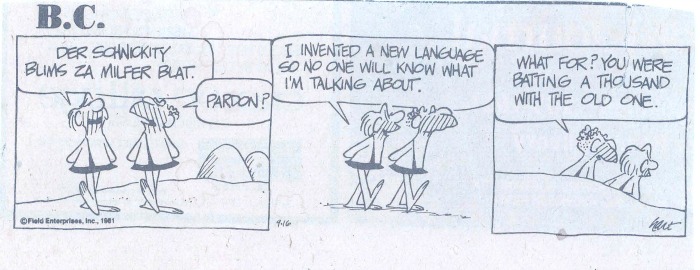Already reeling and darn near senseless, language is still taking body shots, kids.
This post showed up in my LinkedIn feed after attracting some recent comments. It contains this nugget:
Frustration and even anger are common, understandable reactions to new ways of doing things – or even reboots of old methods. This applies not just to Challenger messaging but to any change in the status quo.
At first, I assumed Challenger messaging must refer to the ill-fated Space Shuttle, Challenger, the explosion of which still evokes frustration and anger almost 31 years after it took place. And who could blame any of us for reacting so viscerally to a catastrophically horrible event that was carried on live television? (I worked at Aetna at the time. I remember returning from lunch to find everyone in my department gathered in a conference room, staring at a TV in horrified silence as the disaster was replayed.)
As I read further, I found out I was wrong, of course. The post actually referred to something far less cataclysmic but arguably just as disastrous:
Challenger messages and their component parts – Warmer, Reframe, Rational Drowning, Emotional Impact, New Way Forward, Our Solution – are cleverly branded terms for a time-tested rhetorical structure simple enough that it can be taught to high schoolers. My sophomore English teacher called this form of persuasive writing a causal analysis.
I’ve no doubt I went to high school considerably longer ago than the gentleman who wrote the post in question. In my day, the time-tested precept imparted by all our teachers was called thinking. Alphabetically speaking, it appears on the list of Dying Arts 15 letters below Empiricism and one letter above Understanding. In those Dark Days, in which we were naïve enough to believe we had a perfectly utile vocabulary, we were also callow enough to believe in the adequacy of words, terms, and phrases like:
- Active. Since we understood active was the antithesis of reactive, we’d have grasped the pointlessness of proactive.
- Drill-down. Since detail was working quite well, we’d never have required a substitute.
- Ecosystem: No one who was in high school at the time of the first Earth Day would ever use this word to refer to anything other than the terrestrial environment.
- Impact: This term used to refer to that happened when a meteor hit Earth. In every instance we used influence or affect if we needed a verb, influence or effect if we needed a noun.
As a result, we felt no compulsion to fabricate words, terms, or phrases as faux surrogates for those that already said exactly what we meant to say. And we knew what we meant to say because — in the days before Warmer, Reframe, Rational Drowning, Emotional Impact, New Way Forward, and Our Solution — we were accustomed to thinking.
If it’s lucky, Challenger messaging will meet with a better fate than the Space Shuttle, Challenger.
I hope not.
—
“B.C.” and Characters: © & TM Ida Hart Trust. All Rights Reserved.

